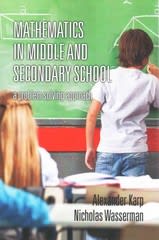Question
Harry is invited to join a game show where he could answer questions correctly to win prizes. As a generous favour, the program has set
Harry is invited to join a game show where he could answer questions correctly to win prizes. As a generous favour, the program has set the initial prize level of $32,000. Now Harry faces a succession of questions, each with two possible answers. If he answers a question correctly, whether because he knows the right answer or because he makes a lucky guess, he proceeds to the next higher prize level. His first question (the one that if correctly answered takes him to the $64,000 level) is named "the $64,000 question" for short; similar abbreviations apply to the following levels. The prize doubles at each level. If he answers the $64,000 question correctly and so reaches the $64,000 level, he faces the $128,000 question, and so on to $256,000, and $512,000. If he reaches the $512,000 level, he faces one final question, and the correct answer to it will win him $1,024,000.
At any level, when Harry gets the question that can take him to the next level, he may choose not to answer it, and leave with the prize of the level he has already reached. At any level, if Harry answers the next question and his answer is wrong, he will leave with only $32,000. At each level, before Harry has seen the question that can take him to the next level, there is a probability that he knows the correct answer. The questions get successively harder, so these probabilities decline from one level to the next.
Before he sees the $64,000 question, the probability that he knows the answer is 40 percent. If he answers this question successfully to reach the $64,000 level, and before he sees the $128,000 question, the probability that he knows the answer to that is 35 percent. Similarly, the probabilities are 30 percent for the $256,000 question, 25 percent for the $512,000 question, and 20 percent for the $1,024,000 question. At each level, once Harry has seen the question, he will know for sure whether he knows the correct answer. Thus, there is no possibility that he is confident but wrong, or that he knows the correct answer but fails to realise that he knows. At each level, after Harry sees the question, if he knows the correct answer, of course he will give it. If he doesn't, he has to decide whether to make a guess, which at any level has a 50 percent chance of being correct, or to walk, that is, leave with the amount of the level he has reached.
Remember that if Harry chooses to guess and is lucky, he proceeds to the next level, but if he chooses to guess and is unlucky, he will have to leave with only $32,000, no matter what level he had reached. Harry's utility function is log_2(\frac{W}{32000})log2(32000W), where W is the amount of dollars of his prize. Take note the utility function is a log function with a base of 2.
?Help Harry find his optimal strategy using a decision tree, namely his plan of action that prescribes, at each level, whether to make a guess if he doesn't know the answer to the question or to walk with the prize of the level he has reached?
Step by Step Solution
There are 3 Steps involved in it
Step: 1

Get Instant Access to Expert-Tailored Solutions
See step-by-step solutions with expert insights and AI powered tools for academic success
Step: 2

Step: 3

Ace Your Homework with AI
Get the answers you need in no time with our AI-driven, step-by-step assistance
Get Started


